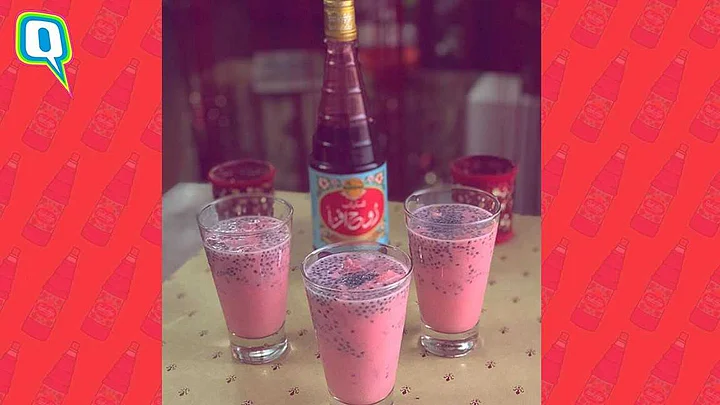“I had RoohAfza for Iftar last night and it remains as sticky and sweet as 30 years ago. No Ramadan Iftar would be complete without the flowery labelled plastic Roohafza bottle. Grandmother would testify to the perfection of her recipe and a voluptuous jug would arrive with authority on the table.’’Maheen Pfeffer, 38, who grew up in Islamabad and now lives in the UAE , shares with TheQuint
If her childhood drink from carefree summers in Islamabad from the 1980s is being served at posh Dubai gatherings in 2019, it shows us that the ruby red syrup Rooh Afza that is said to have first arrived to the Indian subcontinent with the Mughals has a lingering appeal that is not going away in a hurry no matter how many Colas, Pepsis and Frooties are served at the party.
The Rooh Afza we know is all thanks to one Unani herb doctor, Hakim Abdul Majeed, who started the company “Hamdard’’ in Delhi in the year 1906, and went on to create a medicinal drink which became the much-loved summer Sharbat. From that moment on, the sticky red drink stuck close to the subcontinent’s history. With India’s partition in 1947, the company also split – one brother stayed on in India while another left to form Hamdard Laboratories, Pakistan, in Karachi. Later, with the formation of Bangladesh, the Dhaka branch became Hamdard Laboratories Bangladesh in 1971.
“In 1947, most of the family travelled to Pakistan. Only my grandfather, Hakeem Abdul Hameed, and his two sons stayed. Even as his younger brother, Hakim Mohammad Said, went to Pakistan, my grandfather said, ‘I will not be able to leave India because it is my motherland’.’’Abdul Majeed, The great grand son of Hakeem Abdul Hameed told the Gulf News in 2016.
Hamdard Pakistan, exports to the UAE as this story says which is why Maheen was served Rooh Afza there this Ramadan, but here in India there have been some rumours of a Rooh Afza shortage. Some said it was because of a shortage of key ingredients, others say it was a family feud. But what are these key ingredients?
The list of ingredients sounds pretty impressive. They are said to includes flowers like the lily, lotus, blue star water lily. Vegetables like mint, carrot and spinach, fruits like watermelon, citron, strawberries, orange, raspberry, loganberry, blackcurrant, and cherry, concord grapes and flowers like lemon, rose, orange and vetiver –but which of these wonderful ingredients was in short supply we wonder.
Narjis Abedi from Delhi had to send her driver to look for some Rooh Afza. Narjis, 37, hails from the erstwhile Rampur princely family known for their rich culinary heritage. Despite her family’s famous Nawabi dessert recipes, she fondly remembers the simple pleasures of her childhood Rooh Afza.
“It was a yum drink to have. As kids we found it was fascinating because of its colour and it has a very comforting taste… whenever I fast I like to have a drink of Rooh Afza because it brings childhood memories back to me.”Narjis Abedi, New Delhi
The ultimate summer thirst-quencher, whose memory is as sweet as the drink itself, served to counter heat-strokes and palpitations in the blistering summers of Delhi, and soon became a staple during the holy month of Ramzan. But the stickiness of its lingering relevance is something that has also to do with the founder’s insistence that once the perfect flavour had been settled upon, there was no need to tinker with it to keep up with the times...
As told to Huda Tabrez in Gulf News, Majeeb’s grandson said, “When I started working and looked at Rooh Afza, I would come up with suggestions on what we could add to make it better. For six months, I went on harping about all these changes. My grandfather then called me and explained that a lot of time had been invested in the product and after many years, it had now stabilised. We now had a product that best suited people’s needs ... if it is working, why do you need to fix it?”
With inputs from Gulf News and The National
